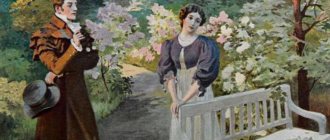- Essays
- School
- Reading
A person who works a lot needs rest. You can just lie on the couch and watch TV. The younger generation will choose a computer, tablet or smartphone. But, one of the most ancient and popular types of recreation is, of course, reading.
Reading, unlike other passive ways of spending free time, allows a person to develop and improve himself. Thanks to reading books, the human brain is constantly working and ages slower. A person who reads is an interesting conversationalist. He is able to achieve a lot in life, as he knows how to beautifully express his thoughts. Human intelligence requires constant development. Reading books allows you to increase your knowledge. A person who knows a lot becomes confident. By reading books, a person borrows ideas from them or improves his own. He turns into a creative person. Employers see these qualities and prefer to hire just such a specialist.
In addition, reading is a very exciting form of relaxation. While reading, a person is mentally transported to a completely different world. Without leaving his room, he can visit not only different countries, but also find himself in fictional worlds.
Television is not capable of conveying a person’s experiences and thoughts as deeply as a book does. If a reading lover has a choice: read a book or watch its film adaptation, then a true reader will, of course, better choose a book.
It is very useful to read to children. While they are still very young, parents should read, and children should listen and retell. When a child learns to read, it is necessary to interest him in reading, and not allow him to spend his free time on the computer. It is impossible to instill a love of reading by force. Parents should show their children by example that reading books is much more interesting than playing on a computer or phone.
As a rule, children who read a lot do better in school. They make fewer mistakes in writing and their speech is rich and beautiful. Reading books teaches a child concentration. To understand the meaning of what you read and keep up with the author’s thoughts, you need to read carefully, and sometimes even re-read some points. This quality helps children in lessons. Children who read are more attentive and understanding students. They will also be pleasant conversationalists in company, always able to listen to their interlocutor.
Reading also helps lonely people who for some reason do not have friends. Literary heroes become their faithful companions in life.
In the modern world, rush and bustle are everywhere. People are rushing somewhere, afraid of not making it in time. As a result of this race for survival, they become stressed. The book is the best doctor. She will reassure the person and give advice on how to live further.
Essay Importance of Reading
Reading is something that helps a person develop throughout his life. And even if he loses everything he has, the knowledge that he acquired in books will remain with him. Scientists have proven that people who read more have a number of advantages over those who read little or do not read at all.
The first advantage is vocabulary, it helps you express your thoughts clearly and communicate with people from different fields of activity. The larger your vocabulary, the more interesting it is for people to communicate with you.
Another benefit of reading is remembering a lot of information in a short period of time. Fiction develops this skill most of all, since it contains many colorful characters with their own stories, feelings and thoughts. And the more a person reads, the easier it is for him to remember more and more information over time.
The next positive effect of reading books is a developed imagination. It cannot be developed in any other way except by reading, and the more a person reads, the more his inner world grows, the easier it is for him to work on some projects in life and no matter in what field of activity
The fourth positive benefit is the development of analytical skills. A person who reads a lot learns to think and look critically at things and the thinking of others.
Reading develops attentiveness. A person who reads is attentive to details and notices what others do not see.
There are many people in the modern world, but they don’t read because they don’t have enough time. But you don’t have to have a book to develop. Nowadays, many alternatives have appeared that perfectly replace books for those who do not have time for it. This includes audio books that you can listen to even when you are busy with something else. But reading is not limited to books alone. Reading newspapers, scientific articles or blocks on various topics is also reading.
If a person wants to develop no matter what, then in any case he will find time to engage in self-development and become better every day. After all, reading is a habit that has a positive effect not only on you, but also on your environment. This is especially true for children who strive to copy the actions of adults in order to appear older. And without noticing it themselves, they read one book after another. Such children develop faster than their peers, become excellent students at school and are simply excellent conversationalists even for adults. And when they grow up, they develop a love for books and their children.
Other essays: ← The book is our friend and adviser↑ SchoolWhat book did I read over the summer →
Why read?
From childhood we are explained the benefits of reading; it is impossible to exaggerate it, just as it is impossible to replace it with other ways of obtaining information and development.
Here's why you need to read:
- Through literature, a person gains knowledge, gets acquainted with the experiences of other people, various strategies, ideas;
- In it he finds answers to many questions;
- It forms a worldview, useful habits, fosters positive qualities, develops thinking, attention, memory, imagination, analytical abilities;
- Literature teaches correct self-determination, self-searching, motivates to achieve new goals, self-development, talks about opportunities that the reader can use in his life;
- Thanks to it, erudition and intelligence develop;
- With its help, a person is distracted from everyday life, relaxes, gets rid of stress, depression, clears his mind, gets rid of the feeling of loneliness;
- Reading is a great way to expand your vocabulary and improve your writing.
The benefits of reading are enormous, so this hobby cannot be replaced by any other, no matter what high technologies come to our world.
Fifty Page Test
Its author is the publisher, author Igor Mann. The essence of this test is very simple - if the work has not impressed the reader by the time he reads its 50th page, there is no need to waste any further time on it. It may be boring, uninteresting, not useful, etc. But when we start reading, we often expect that the plot will begin to entice with new twists, the dynamics of the events described will grow rapidly, and the author’s style will begin to delight with ease. But this does not always happen, and throughout the entire reading we do not expect this. So, this won’t happen if it hasn’t happened by page 50.
Every year, writers and publishers delight readers with thousands of new works, and even if the latter choose the best of them, there is still not enough time to read them all. So why waste it trying to force yourself to master something that you just don’t want to master? When we choose the best book, those that fail the “fifty page” test can not only be put aside until better times, the right mood, a successful combination of stars... They can be immediately gifted to someone. The fact is that if a piece doesn’t catch your attention the first time, the chances that it will do so the 2nd, 3rd or 10th time tend to zero.
How do books adapt to new readers?
This issue should be considered not only from the point of view of content. Yes, today thousands of works are published “on the topic of the day”, the events described in them fit into the picture of the world of modern man, his realities. They are mostly understandable and easy to understand, but this does not mean that only they can be interesting, because the unshakable classics, for example, have not been canceled.
How, then, does literature adapt to new readers? By this we can understand the new ways of presenting and receiving information that technological progress has given us. The atmosphere created by the smell of the pages, their rustling, and the sensations that touching them gives is unique. It enhances the pleasure of reading, making it more comfortable and enjoyable.
But today, reading works in electronic format online or downloaded from the Internet is a common occurrence. There are many special sites where you can find almost any book in .txt, .fb2, .epub, etc. format, and on many of them you can do this for free and without registration.
You can download the work not only on a tablet, phone, laptop, computer - you can learn how to choose an e-book - a gadget that is specifically designed for this. Its advantages are that it is comfortable for the reader's eyes, mobile and compact. When chosen correctly, the reader screen does not reflect, does not give off glare, and is perceived by the eye as a page of a real paper version.
You can take your e-book with you to enjoy your favorite activity anywhere - in transport, on vacation, during a break at work, etc. At the same time, you can download many free works on special sites - such as the creations of little-known authors , and real world bestsellers.
Not all new users know how to choose a book online. But it's easy to do. They are located in sections - by genre, by author, and on some sites, by time of publication. Therefore, you need to find the genre you are interested in, study the presented list of works, read the annotation and understand whether you want to read one or another of them. Select a book from the library and start reading it - first 1-2 pages to get a first look at the plot. Don’t forget about the “fifty page” test, and if your chosen literature passes it, continue to enjoy your chosen creation.
Interest
One of the selection criteria is interest. It implies a certain emphasis placed in the work. Interest is also thought or even writing style. At its core, interest is what catches you in a work.
On what basis do children choose books – for their love of animals or fantastic, imaginary locations. A similar principle applies to adults. If a person is a romantic by nature, it is better to choose a romantic novel; if he loves fantasy more, there is no need to be overly overloaded with a love story.
The interest of books, as if the color of books are their main characteristics, but it is difficult to predict in advance which work will be really interesting. If there is a need to choose a book for a child, it is better to immediately ask about preferences and certain interests.
Look for books in the same series
A book series is a book that the publisher, based on various criteria, defines as components of one particular sequence. As a rule, they are published by the same publishing house, and you can recognize them by their similar design (background, style, font). Thus, just looking at the cover, you can determine whether the work is included in a particular series.
One of the varieties of book series is author series, which may include works not only by one author, but also by several, but they are recommended by the same writer. They can be published in any genre - detective, fantasy, science fiction, novel, humorous prose, scientific journalism.
How does this affect how to choose a book to read? Typically, if a reader likes at least one of the works in a series, then he will most likely be interested in the others included in it.
It is believed that the release of such is a commercial move by modern writers, thanks to which they try to stand out and “promote” their name. However, many experts in the field of book publishing believe that this is a good approach that allows us to create a market for quality literature. Thanks to it, it is possible to study the demand of readers and replenish libraries and bookstore shelves with real bestsellers, which become popular among many reading fans.
Feel free to read books that are “dubious” in the eyes of others
Not all books receive great recognition, which is not an indicator of quality. Readers' tastes are as changeable as those of film fans. Many books lie undervalued on bookstore shelves and their first wave of popularity occurs decades after publication.
“Doubtful” books are often unclear or do not have a clear theme. This includes works with atypical themes or very unusual, scandalous books with an atypical narrative. "Dubious" is just a generally accepted term, and does not always mean "bad."
“Doubtful” also includes works that have received a negative rating or criticism. They have not been tested by certain general criteria, which does not make them unreadable. The main guideline when choosing a novel is your own preferences.
Why you can’t rely only on online reviews: because for every work there is a reader. Even “dubious” novels have their own fan club. The popularity of the novel is also not important in this matter.
If you are attracted by a good plot, you should give the novel a chance - read a couple of pages, evaluate readability or other criteria. For such experiments, a website where you need to register to read a fragment is well suited - if the format is suitable, you can then buy the book. The free option is the most win-win. Next, the work is downloaded in convenient formats such as fb, epub, txt.
There are many pitfalls in the “dubiousness” of a work: they affect the ratings of the novel, but do not reflect its true meaning, essence. If large amounts of money are not invested in the book, for example, a novice author worked on it, then marketing steps will be minimal - such works are often undervalued.
The “dubiousness” of a work matters only if the rating of the novel is of particular importance - for studying literature, for writing essays. In such cases, you will have to adhere to certain conditions and pay attention to the opinions of critics.
Summarize
How to choose books
After reading it, the reader is usually still impressed by it for some time; images of the characters, described circumstances and events emerge in the imagination. After finishing reading, it would be useful to analyze what you read, draw conclusions, draw lessons for yourself based on the plot of the book and its characters.
Use all the described techniques when choosing literary works so as not to waste your time and effort on those that will turn out to be boring, uninteresting, and useless for you. Reading should bring pleasure and benefit - these are the main criteria by which you can call a book quality.
How to recommend books to friends?
We do not have the right to impose our opinion on anyone, but every person wants to discuss a work they like with someone, and this process is most interesting when such conversations are conducted with a loved one. No one is saying that he will have to be forced to read the literature that you like, but he can be motivated differently to read this or that work.
Use effective techniques to unobtrusively but effectively push a person towards this:
- Just share your impressions of the book you read. Tell us about your delight at the fact that you experienced a lot of emotions while reading, try to describe them as vividly as possible;
- A good work should be useful. Analyze how it turned out to be useful for you and tell a friend about it (but without going into too much detail of the plot);
- In a conversation, quote interesting passages - phrases, sentences, statements of characters. It often happens that a person, often hearing interesting quotes from someone, asks where the latter “got all this” from. In this case, you can answer that you read them all in the book;
- Retell some interesting story from it. Even if we take into account that such a technique is partly a spoiler, it can arouse interest. When using it, it is very important not to talk about the outcome of the entire plot, and you should try to limit yourself to the facts of only one story. This is necessary in order to simply lift the veil of a fascinating world, in order to motivate a person to become familiar with it from the first to the last letter;
- Don't forget to mention the author, the genre, and how long it took you to read the work. By the way, if the author is not widely known, you can compare his work and writing style with one of the luminaries so that your friend understands what the style of the story is;
- You should not talk about your literary discovery at length and at length. Remember that brevity is the sister of talent, and with long stories you can cause the opposite effect - your friend will get bored with long summaries and will not want to read it. Plus, you have to keep the plot intriguing, and constantly talking about it doesn't help that;
- Try not to go into details when describing the characters. Firstly, the future reader himself will have to form his own perception and vision of their images and character. Secondly, by giving detailed descriptions, you may unwittingly reveal the plot. Thirdly, the reader is more interested in the storyline than the characters themselves, at least before reading begins.
So, select the books you want from your list - those that you would like to recommend to your friends, and, using the listed techniques, do so.
Read a page or two
If you don't try, you won't understand. This principle also applies when choosing literature. Take the time to read the beginning of the work - it will give you a lot:
- Already after reading the first few pages of the work, you will be able to assess whether its plot is exciting for you;
- Having familiarized yourself with its beginning, you will have time to become familiar with the author’s style - how easy it is to understand, interesting, readable;
- If after reading the first pages you realize that you cannot stop, undoubtedly, you have completed the task of which book to choose to read.




